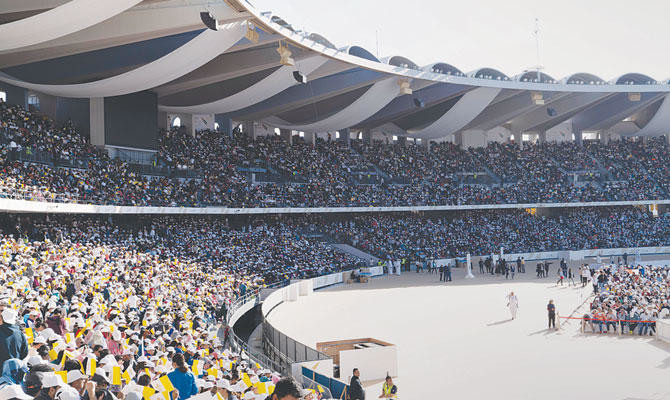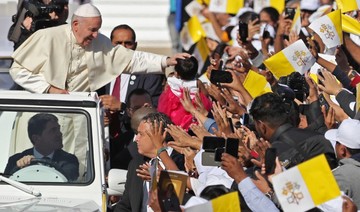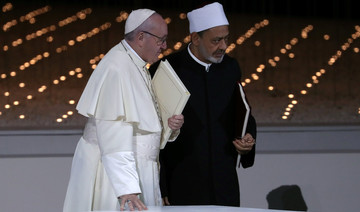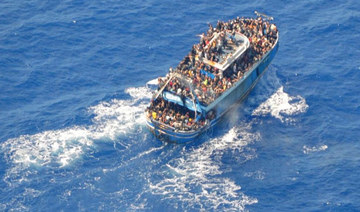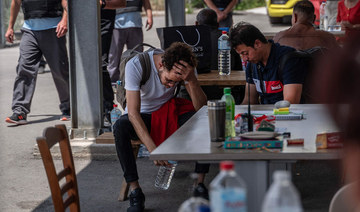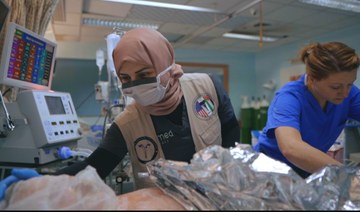ABU DHABI: They came by coach, by car and on foot to the stadium at Zayed Sports City, in carefully planned convoys and spur-of-the-moment trips.
They came in their tens of thousands, and each had a tale to tell of the day they came up close and personal with Pope Francis in the UAE capital Abu Dhabi.
In a true test of faith, Lena Malpiedi from Denmark and her Italian husband drove through the night all the way from Oman’s capital Muscat in order to attend the holy mass.
“We’ve never seen the pope before. Standing here between Christians and Muslims while knowing of the clashes around the world, it sends an extremely strong message. We need more like it,” she said.
Many of those who wanted to perform this unique and historic pilgrimage traveled much shorter distances, but nonetheless were faced with challenges.
Thousands traveled in a massive convoy of coaches overnight from Dubai — where the biggest Catholic community in the Gulf resides — for the event.
Dubai expat Rosalie Ayuso from the Philippines, her husband Paul and his three siblings were among the many who mastered the logistics of the coach convoy down the busy E11 motorway to Abu Dhabi.
“We went to the pickup point at 12 a.m. and the bus left Dubai after an hour. We arrived at 3 a.m. and waited for two hours before they let us into the stadium,” said Ayuso.
She had not slept for at least 24 hours, but that did not matter once she had glimpsed the pope. “Sometimes you have to make these sacrifices. It’s all worth it in the end,” she added.
The scene inside the stadium, and on the lawns in front of big screens outside, was a family affair, but not all families were lucky enough to get seats together.
Filipinos Krisha and Keith Ayuso, who got tickets outside the stadium, were separated from two of their other siblings who were seated inside.
“Our brother and sister, who had a better view of the pope inside, were sharing pictures with us through WhatsApp,” Keith said, adding that their experience was just as good because they got to see the pope when he toured around the stadium in a white Mercedes car. aThe Ayuso siblings said they grew up going to church together, and that has made their relationship strong.
“Going to church as a family has made us see the importance of being together, which we consider is our greatest wealth,” Paul said.
Christopher Hilis, a Filipino who volunteered as a helper for the visit, was dropped at the site of the papal mass on Monday night, and had to stay there until Tuesday morning to help with preparations.
Smiling and excited, he told Arab News: “Luckily I was posted at gate 31, where the pope was coming in. I lost a lot of zzz’s, but it’s all worth it to see the pope in a Muslim country. It’ll take away the stigma that Muslims and Christians must be separate.”
Hilis moved to the UAE three years ago, and had no clue he would get the chance to meet the pope, in Abu Dhabi of all places. “The UAE is making change possible,” he added.
For Shanelle D’sa, this was not the first time she attended a mass with Pope Francis. She had been at one of his first papal masses in Brazil, but she said that did not take away from the joy she felt this time.
“It’s an experience you can’t really put into words. I didn’t expect it to be possible, a holy mass in the UAE,” she added.
In yet another family grouping, Roselyn Netto, an Indian woman living in Dubai, was with her husband and two children, aged 7 and 1.
“It’s really nice. I feel peace in my heart right now. It’s a great chance for me and my family, especially my kids, that we got the blessing from Pope Francis,” she told Arab News.
Many of them stayed on after the mass, when the stadium and lawns were turned into an impromptu pop concert venue starring Filipino “pop princess” Sarah Geronimo, and families enjoyed picnics in the pleasantly warm afternoon sunshine.



